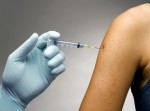 Researchers are planning the first clinical trial to test a vaccine that protects against MERS-CoV—the coronavirus that causes Middle East respiratory syndrome (MERS).
Researchers are planning the first clinical trial to test a vaccine that protects against MERS-CoV—the coronavirus that causes Middle East respiratory syndrome (MERS).
In a recent issue of the Journal of Virology, a team of researchers at Ludwig Maximilian University of Munich in Germany have concluded that the MERS-CoV vaccine MVA-MERS-S has successfully passed preclinical tests and human trials can begin. The vaccine, according to the team, demonstrated its protective effect on mice that were diagnosed with the coronavirus.
The study shows that the MERS virus couldn’t replicate itself in mice that were given high doses of the vaccine. Vaccinated mice also had lower levels of MERS DNA found in their lungs compared to mice that weren’t vaccinated. In the early stages of the study, researchers found the vaccine had the anticipated immune reaction in cell cultures as it produced protective levels of defusing antibodies.
The first incident of MERS surfaced in Saudi Arabia in 2012 and has since spread throughout the world, including the Arabian Peninsula, the U.S., Germany, and South Korea. To date, there are 166 confirmed cases of MERS in South Korea with 12 fatal deaths—the largest outbreak outside of the Middle East.
A MERS-CoV infection will cause flu-like symptoms, but can quickly progress to a fatal respiratory illness. Approximately 36% of people who are diagnosed with the virus die.
The next step is proceeding with human trials.
Source for Today’s Article:
Paddock, C., “MERS vaccine ‘ready for human trials,” Medical News Today web site, June 29, 2015; http://www.medicalnewstoday.com/articles/296023.php.
